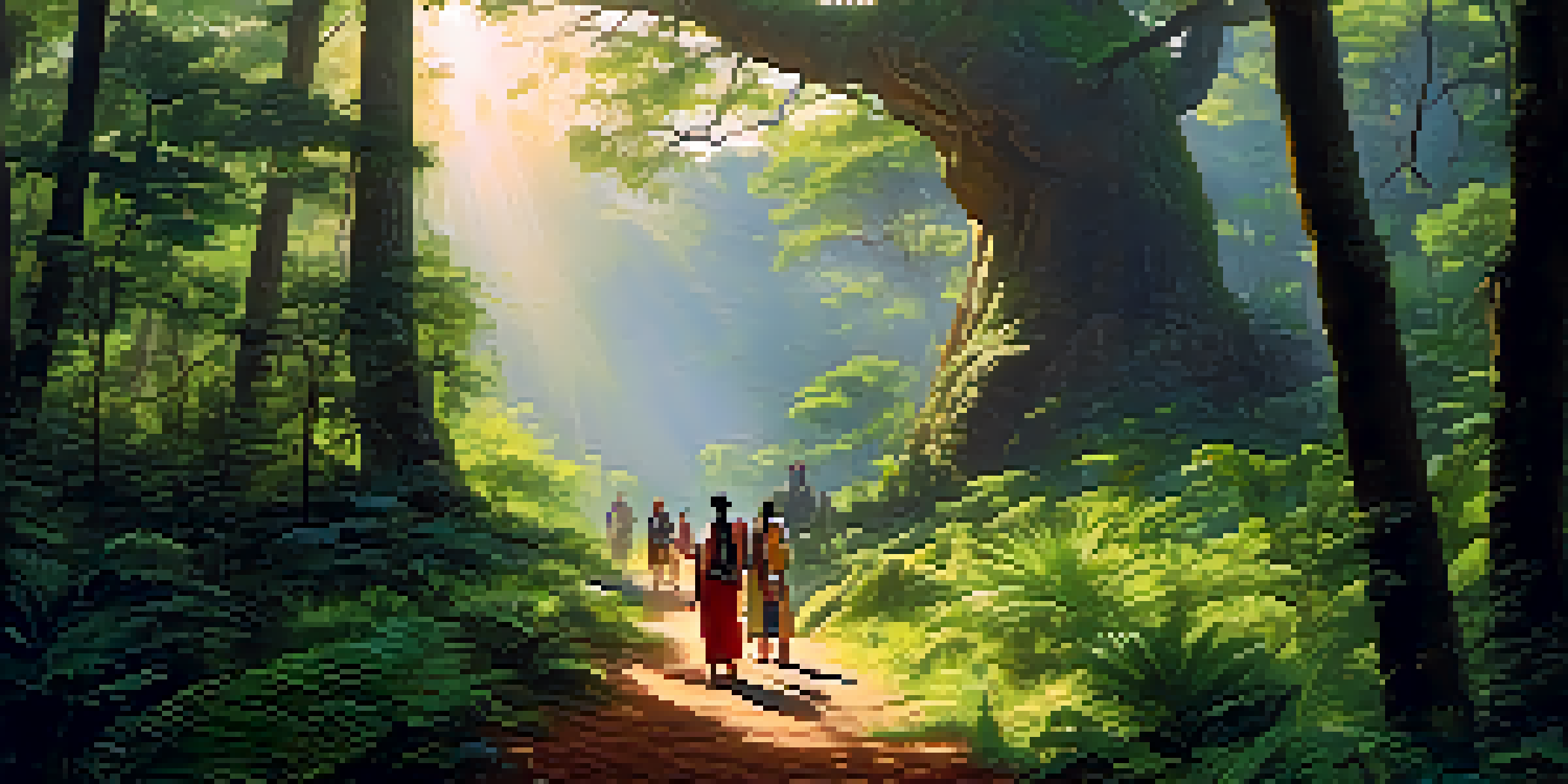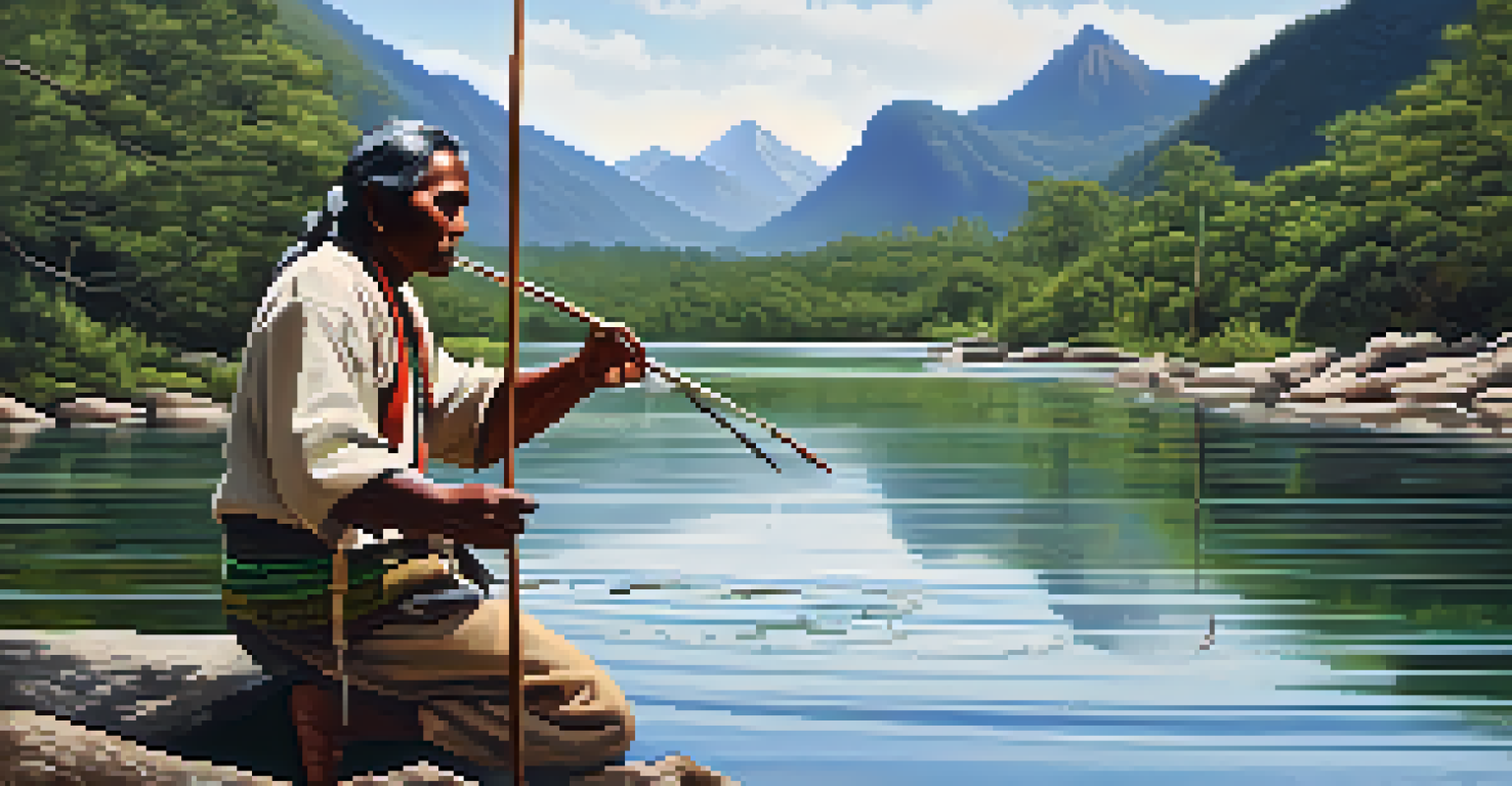The Role of Indigenous Communities in Wildlife Tours

Understanding Indigenous Communities' Connection to Nature
Indigenous communities have a profound relationship with the land and its wildlife, often viewing themselves as stewards of nature. This connection is deeply rooted in their cultural practices, traditions, and beliefs, which emphasize respect for the environment. For instance, many Indigenous groups practice sustainable hunting and fishing, ensuring that animal populations remain healthy and ecosystems thrive.
The land is not just our livelihood, it is our life. We are part of it, and it is part of us.
This relationship isn't just about survival; it's about a holistic understanding of the environment. Indigenous knowledge systems, passed down through generations, encompass intricate details about local wildlife behavior, migratory patterns, and ecosystem health. Such wisdom can greatly enhance the experience for wildlife tour participants, offering them insights that go beyond traditional tourism narratives.
By integrating these traditional practices and knowledge into wildlife tours, Indigenous communities provide a richer, more authentic experience. Tourists gain a deeper appreciation of nature, learning the importance of biodiversity and conservation directly from those who have lived in harmony with it for centuries.
Economic Benefits of Indigenous-Led Wildlife Tours
Wildlife tourism can be a significant source of income for Indigenous communities, creating jobs and economic opportunities. By leading tours that showcase their land and wildlife, these communities can retain a greater share of the profits compared to traditional tourism models. This economic empowerment allows them to invest in community projects, healthcare, and education.

Moreover, Indigenous-led tours often prioritize sustainable practices, ensuring that tourism does not harm the environment. For example, by limiting group sizes or utilizing eco-friendly transportation, these tours can minimize their ecological footprint while still providing memorable experiences for visitors. This balance between economic benefits and environmental stewardship is crucial for long-term sustainability.
Indigenous Stewardship of Nature
Indigenous communities act as stewards of the land, practicing sustainable methods that promote biodiversity and ecosystem health.
The success of these tours can inspire other communities around the world to adopt similar models, showcasing how Indigenous knowledge can lead to both economic and ecological resilience. As travelers increasingly seek authentic and responsible tourism options, the demand for Indigenous-led wildlife experiences is likely to grow.
Cultural Education Through Wildlife Tours
Wildlife tours led by Indigenous communities offer a unique opportunity for cultural exchange. Tourists not only observe wildlife but also learn about the cultural significance of various species and their roles in Indigenous stories and traditions. This educational aspect fosters a greater respect for both the culture and the environment.
When we heal the earth, we heal ourselves.
For instance, a tour might highlight the importance of a particular animal in local mythology, providing insight into how that animal influences community values and practices. Such experiences help tourists understand that wildlife is not merely a backdrop for photos but a vital part of a living culture. This deeper understanding can enhance the tourist's experience and create lasting memories.
Furthermore, as visitors engage with Indigenous guides, they contribute to the preservation of these cultures, helping to ensure that traditional knowledge is passed on to future generations. This cultural education enriches the wildlife tour experience, making it more meaningful and impactful for everyone involved.
Conservation Efforts Supported by Indigenous Communities
Indigenous communities are often at the forefront of conservation efforts, utilizing their deep understanding of local ecosystems to protect wildlife and habitats. Many communities have established initiatives that focus on preserving endangered species and restoring natural environments. This proactive approach not only benefits local wildlife but also enhances the overall health of the ecosystem.
For example, some Indigenous groups have successfully fought against deforestation or pollution in their areas, leveraging their traditional knowledge to advocate for sustainable practices. By participating in wildlife tours, tourists can directly support these conservation initiatives, with a portion of their fees often going toward preservation projects.
Economic Empowerment Through Tours
Indigenous-led wildlife tours create economic opportunities for communities while prioritizing sustainable tourism practices.
This symbiotic relationship between tourism and conservation helps foster a culture of awareness and responsibility among visitors. When tourists see the positive impact of their participation, they are more likely to advocate for conservation efforts in their own communities, creating a ripple effect that extends far beyond the tour itself.
Challenges Facing Indigenous Communities in Wildlife Tourism
Despite the benefits, Indigenous communities often face significant challenges in the wildlife tourism sector. Issues such as land rights, recognition, and access to funding can hinder their ability to fully participate in and profit from tourism. Many communities are still fighting for acknowledgment of their sovereignty and the right to control their resources and land.
Additionally, there can be a disconnect between Indigenous perspectives and mainstream tourism practices, leading to misunderstandings or exploitation. For instance, some tour operators may not respect cultural protocols or may misrepresent Indigenous knowledge, which can damage trust and relationships. It's crucial for tourists to choose ethical operators that prioritize Indigenous rights and perspectives.
Addressing these challenges requires collaboration between Indigenous communities and tourism stakeholders. By working together, they can create frameworks that respect Indigenous rights while promoting sustainable tourism practices that benefit both the communities and the environment.
The Importance of Authentic Indigenous Experiences
As travelers increasingly seek authentic experiences, Indigenous-led wildlife tours offer a unique perspective that conventional tourism often overlooks. These experiences allow tourists to interact directly with Indigenous cultures, fostering genuine connections and understanding. Authenticity in tourism not only enriches the visitor's experience but also honors the stories and traditions of Indigenous peoples.
For example, participating in a traditional hunting or fishing expedition led by Indigenous guides can provide insights into their sustainable practices and cultural significance. Such experiences help to break down stereotypes and promote a fuller understanding of Indigenous lifestyles, showcasing their resilience and adaptability in the face of modern challenges.
Cultural Education Enhances Experiences
Wildlife tours provide tourists with insights into Indigenous cultures, fostering respect and understanding of their traditions and ecological knowledge.
Ultimately, these authentic experiences can lead to a more meaningful and respectful relationship between tourists and Indigenous communities, benefiting both parties. As travelers share their stories and experiences, they can help raise awareness about the importance of supporting Indigenous rights and conservation efforts.
Looking Ahead: The Future of Indigenous Wildlife Tourism
The future of wildlife tourism is increasingly intertwined with Indigenous communities, as more travelers seek sustainable and authentic experiences. This trend presents an opportunity for Indigenous groups to reclaim their narratives and share their knowledge with the world. By leading the way in wildlife tours, they can shape the industry's direction toward more ethical practices.
Moreover, as awareness of climate change and environmental issues grows, the insights offered by Indigenous communities become even more critical. Their traditional ecological knowledge can provide valuable strategies for conservation and sustainability, which are essential in addressing the challenges facing wildlife today.

Collaboration between Indigenous communities, tourists, and conservation organizations will be key to ensuring the long-term success of wildlife tourism. By prioritizing Indigenous voices and fostering partnerships, the future of wildlife tours can become a platform for education, empowerment, and ecological stewardship.